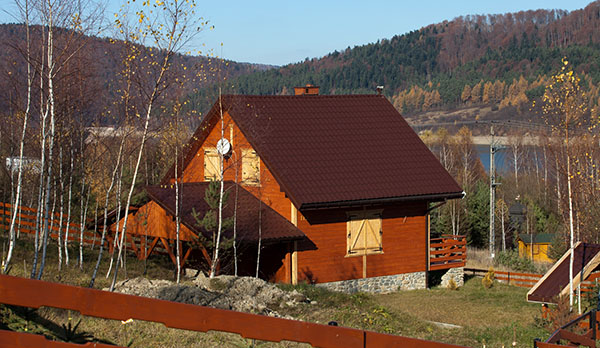The cottage has always been your little slice of heaven. But, due to your age and stage, the costs associated with cottage ownership— or whatever the reason—you’ve decided to sell. Here are some tips on how to sell your cottage and achieve the best outcome—for both you and for your family.
First decide whether to keep it in the family
“Any cottage owner will tell you that a cottage is more than just a house by the lake,” says Sam Lieberman, CPA, CA of North York. “There is a sort of magic that happens when a family comes together up at the cottage. As a result, cottage owners will often want to ensure the cottage is kept in the family.”
Unfortunately, adds Lieberman, the sale or gift of a cottage to children or other family members all too often leads to unplanned financial and personal results.
“Before deciding to sell or gift the cottage to your children, reflect on what owning the cottage could mean to them,” advises Lieberman. “Ask yourself whether they have shown any interest in owning the cottage, and whether there may be conflict among your children about sharing and maintaining it.” You should also consider whether your children have the resources to maintain the cottage, and how you will treat your children fairly if some want the cottage and others do not.
If you do decide to transfer the cottage to your children, think about the financial implications. “Even if you gift the cottage to your children, it is still treated as a sale at fair market value for tax purposes,” explains Sharon Brown, CPA, CA of BDO Canada LLP in Guelph. “You may therefore want to defer the transfer of the cottage to your children until after your death, and make the tax liability part of your estate planning.”
Spruce it up
As is the case with any piece of real estate, the better the cottage shows, the higher price it will fetch.
“Do obvious repairs inside, including repainting,” advises Brown. “A cottage sale can be different from a house sale, in that cottages are often sold with their contents, including furniture and dishes. If this is the case, go through the contents and discard what should be thrown away. Too much junk in a cottage puts people off.”
In addition to de-cluttering and tidying, Lieberman suggests replacing cracked floor or counter tiles, patching any holes in the walls, fixing leaky faucets, and repairing doors and drawers that don’t close properly.
“Outside, ensure the trees are trimmed so the view of the water is unobstructed,” he suggests. “Re-stain wooden decks and docks, clear pathways and walkways and replace loose flagstones.”
Hire a realtor and assemble your documents
“Use a realtor who specializes in listing cottages in your area,” says Brown. “A local realtor will have a better idea of the current market and how to best present your cottage.”
Ask your neighbours which realtor they would use and look for realtors reputed to go “above and beyond” to satisfy their customers. “The saying ‘20 percent of the agents do 80 percent of the business’ is true,” says Lieberman. “The best agent for you doesn’t necessarily work at the largest brokerage, close the most deals or make the most money. The best agent for you is an experienced professional who will listen to you, behave ethically and who knows your market.”
You can research realtors online, but exercise caution when doing so. “Often the agents listed on websites have paid to be listed there, so it’s no assurance of quality,” explains Lieberman. “A better bet is to Google the top real estate companies in your area and look up the profiles of individual agents at offices near you.”
Make sure you have the documents you need for the sale. “You need a copy of your deed or other proof of ownership and, ideally, a survey that describes the property,” says Brown.
Determine the tax implications
“When you sell your cottage, and the value of the property has appreciated, then tax will become payable at that time on the difference between the proceeds of the sale and the total of its adjusted cost base,” says Lieberman. “This is generally a capital gain for income tax purposes, and taxes will be assessed at up to approximately 25 percent in Ontario on the gain.”
It is important to have records of the cost of your cottage and major renovations, in order to minimize the capital gain. “You need receipts for any major renovations, such as the cost of building an addition, dock or boathouse, replacing the roof or work on your well or septic system,” says Brown. “These receipts will help determine the adjusted cost base of your cottage—which is the sum of the original cost of the property and the cost of major renovations.”
If you sell to your children, the capital gain will be based on the fair market value of the property, regardless of the actual sale price, because the sale is considered to be between “non-arm’s length parties.”
“If you sell to your children at less than the fair market value, not only will you pay tax as though you received fair market value, your children will have an adjusted cost base equal to the amount they paid, possibly leading to double taxation,” cautions Lieberman. “If you do sell to your children, consider spreading out the gain on the sale over five years. You may be able to use the capital gains reserve and pay taxes on the capital gains over time, instead of all in one year.”
You may be able to shelter the capital gain on the sale of your cottage by using the principal residence exemption. “A cottage can be designated as a principal residence, even if you don’t use it as your primary residence, as long as it is ‘ordinarily inhabited’ at some point during the year,” says Lieberman.
Before you sell your cottage, talk to a Chartered Professional Accountant about the tax implications. “If you have more than one residence, you need to decide whether to exercise the principal residence exemption,” says Brown. “Depending on where it is located, your cottage may have appreciated more than your house. It’s best to seek advice on all the tax implications involved.”
Brought to you by the Chartered Professional Accountants of Ontario.
 Pride News Canada's Leader In African Canadian & Caribbean News, Views & Lifestyle
Pride News Canada's Leader In African Canadian & Caribbean News, Views & Lifestyle





